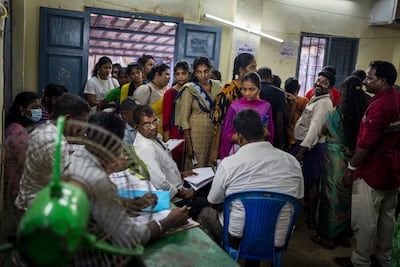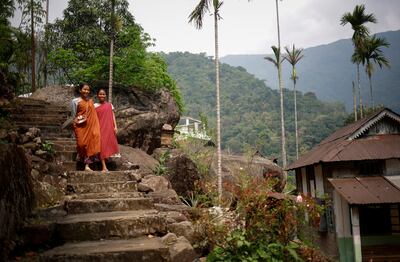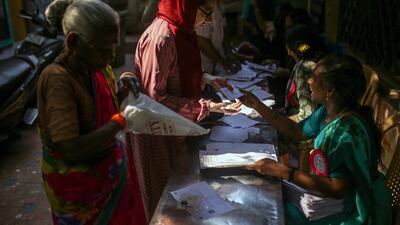Nearly 100 million people voted in the first round of India’s staggered national elections that began on Friday.
About 970 million people are eligible to vote in total across the seven-phase elections, which will conclude on June 1.
About 166 million people were registered for the first round of the elections for 102 parliamentary seats, stretching from the Himalayas to the coasts of Indian Ocean.
The Election Commission of India said 60 per cent of the registered citizens cast their votes, with several incidents of violence reported from the poll-bound areas.
"Against the backdrop of a largely peaceful and conducive environment, the nation's diverse electorate painted vivid pictures of democracy in action. From bustling city centres to remote villages, the polling stations witnessed a colourful convergence of voters spanning generations and backgrounds," the ECI said.
About 1,600 candidates were in the fray for the first round, with the country’s election authorities setting up almost 200,000 polling stations and employing 1.8 million officials to conduct the mammoth operation.
The ECI had set up a polling station in a remote village in Himalayan Arunachal Pradesh state after a treacherous 40 kilometre-trek for its sole voter, a 44-year-old woman, to enable her to exercise the right to vote.

TV channels broadcast footage of voters queuing at polling stations in sweltering heat, as temperatures hovered at 42C in some places.
This year’s election is the second-longest in the history of the country.
India took four months to complete its first general election in 1951-1952, while the operation took 39 days in 2019.
The first phase of polling this year took place across 21 states and nine federally controlled territories.
Prime Minister Narendra Modi's Bharatiya Janata Party and its allies are mainly competing against Indian National Congress-led INDIA bloc, an alliance of 26 parties.
"I urge all those voting in these seats to exercise their franchise in record numbers. I particularly call on the young and first-time voters to vote in large numbers," Mr Modi said on X on Friday morning. "Every vote counts and every voice matters".

The major states where polls were held were West Bengal, Bihar, Assam, Madhya Pradesh, Maharashtra, Rajasthan, Tamil Nadu, Uttarakhand and Uttar Pradesh.
In western Uttar Pradesh, the bellwether state with 80—the highest number of parliamentary seats, nearly 58 per cent voting was recorded.
Mr Modi’s BJP had swept 71 seats in the state but lost about nine seats in 2019 when its winning tally dropped to 62 seats.
In southern Tamil Nadu state where voting was held for all 39 seats, a turnout of 62.19 per cent was recorded.
The region is traditionally dominated by the ruling Dravida Munnetra Kazhagam and BJP has been struggling to make inroads. DMK is part of the Congress-led INDIA bloc.
Mr Modi’s party had performed dismally in last elections when it could not secure a single seat. The Prime Minister has held a series of public rallies in the southern state to create a foothold in the region.
Voters used electronic voting machines that list the candidates and symbols of their political parties. People cast their ballots by pressing the button next to their preferred candidate's name.
The machines also have a serial number in Braille to help visually impaired voters.
“I am happy that I have got the right to vote for the first time,” said Pradyuman Kumar, from the Gaya constituency of the eastern Bihar state.
"I have come here to exercise my rights. I will vote for a candidate who will work on health, education, employment, and causes of laborers."
Among the millions of voters was a 108-year-old woman, who cast her vote in Cooch Behar district in West Bengal.

Authorities had made arrangements to help voters with drinking water, washrooms, ramps, wheelchairs, help desks, and volunteers at polling stations.
Dozens of helicopters and trains and about 100,000 vehicles ferried polling and security personnel across the country. Surveillance teams were in operation during the elections.
Violence was reported in restive Manipur state, where armed groups fired automatic rifles and damaged voting machines, amid ethnic violence that has escalated since May last year.
A police officer was also wounded in a landmine explosion in central Chhattisgarh state, where Maoist rebels have called for a boycott of the election.
Fifty-six villagers in Chhattisgarh's rebel-hit Bastar region cast their votes in a polling booth set up in their own village for the first time in a Lok Sabha Election for the first time since independence.

Several prominent leaders were standing in constituencies contested on Friday, including Nitin Gadkari, a senior BJP official and Minister of Road Transport and Highways, who is seeking a third consecutive election victory in Nagpur, in the western state of Maharashtra.
One of the richest candidates, Nakul Nath, is seeking re-election from Madhya Pradesh's Chhindwara constituency as a candidate of the main opposition Congress party.
There are six major parties, including the BJP and Congress party. The BJP is one of 38 parties making up the National Democratic Alliance, while the Congress has joined forces with 25 other parties to form the INDIA alliance.
The four other largest parties are all members of INDIA: The Aam Aadmi Party, which controls the capital Delhi and the neighboring Punjab state, the Dravida Munnetra Kazhagam, the ruling party in southern Tamil Nadu state, and All India Trinamool Congress, which controls the eastern state of West Bengal.
“The fight to protect our constitution and democracy begins today. When you push that button on the EVM, pause and reflect for a second. Do you want our institutions to be subverted through dictatorship, or do you want to protect democracy? You are now the decider of India’s destiny,” said Congress president Mallikarjun Kharge.
The second phase of polling for 89 seats in 13 states and federally ruled territories will be held on April 26.


















